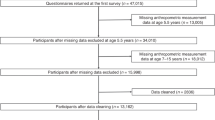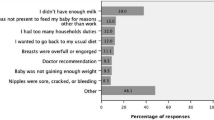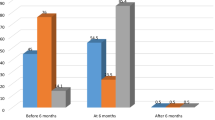Abstract
Background
Epidemiological evidence on the relationship between breastfeeding duration in early childhood and subsequent depressive symptoms in adolescence is limited. This prebirth cohort study examined whether a longer breastfeeding duration was associated with a reduced risk of depressive symptoms in adolescents at 13 years.
Methods
The study included 872 mother–child pairs. Adolescent depressive symptoms were assessed using a 20-item Center for Epidemiologic Studies Depression Scale score of ≥16.
Results
The risk of depressive symptoms was 23.2% among the 872 adolescents aged 13 years. A reverse J-shaped association was found between breastfeeding duration and depressive symptoms at 13 years. Compared with <6 months of breastfeeding, 6 to <18 months, but not ≥18 months, of breastfeeding was significantly associated with a reduced risk of depressive symptoms. The adjusted odds ratios (95% confidence intervals) for depressive symptoms at 13 years for <6 months, 6 to <18 months, and ≥18 months of breastfeeding were 1 (reference), 0.58 (0.34−0.99), and 0.78 (0.46−1.32), respectively.
Conclusions
The present study found a reverse J-shaped association between breastfeeding duration and depressive symptoms at age 13. Breastfeeding for a duration of at least 6 months may be recommended to prevent adolescent depressive symptoms.
Impact
-
Epidemiological evidence on the relationship between breastfeeding duration in early childhood and subsequent depressive symptoms in adolescence is limited.
-
The current prebirth cohort study is the first to report a reverse J-shaped association between breastfeeding duration and depressive symptoms at 13 years.
-
Compared with breastfeeding for <6 months, breastfeeding for 6 to <18 months, but not ≥18 months, was significantly associated with a reduced risk of depressive symptoms at 13 years.
This is a preview of subscription content, access via your institution
Access options
Subscribe to this journal
Receive 14 print issues and online access
$259.00 per year
only $18.50 per issue
Buy this article
- Purchase on SpringerLink
- Instant access to the full article PDF.
USD 39.95
Prices may be subject to local taxes which are calculated during checkout
Similar content being viewed by others
Data availability
Data not available due to ethical restrictions.
References
Rao, U. & Chen, L.-A. Characteristics, correlates, and outcomes of childhood and adolescent depressive disorders. Dialogues Clin. Neurosci. 11, 45–62 (2009).
Murakami, K., Miyake, Y., Sasaki, S., Tanaka, K. & Arakawa, M. Fish and n -3 polyunsaturated fatty acid intake and depressive symptoms: Ryukyus Child Health Study. Pediatrics 126, e623–e630 (2010).
Beller, J. et al. Decline of depressive symptoms in Europe: differential trends across the lifespan. Soc. Psychiatry Psychiatr. Epidemiol. 56, 1249–1262 (2021).
Li, J.-B. et al. Online social networking addiction and depression: The results from a large-scale prospective cohort study in Chinese adolescents. J. Behav. Addict. 7, 686–696 (2018).
Jayaweera, R. T. et al. Associations between WASH-related violence and depressive symptoms in adolescent girls and young women in South Africa (HPTN 068): a cross-sectional analysis. BMJ Open 12, e061032 (2022).
Tran, Q. A., Le, V. T. H. & Nguyen, T. H. D. Depressive symptoms and suicidal ideation among Vietnamese students aged 13–17: Results from a cross-sectional study throughout four geographical regions of Vietnam. Health Psychol. Open 7, 205510292097325 (2020).
Giri, R., Khadka, S., Chalise, A., Swar, K. & Paudel, S. Depressive symptoms and its associated factors among secondary school adolescents of Birtamod Municipality, Jhapa, Nepal. PLOS Glob. Public Health 4, e0002826 (2024).
Krol, K. M. & Grossmann, T. Psychological effects of breastfeeding on children and mothers. Bundesgesundheitsblatt Gesundheitsforschung Gesundheitsschutz 61, 977–985 (2018).
Almeida, C. Rde et al. Exposição ao aleitamento materno e transtornos mentais comuns na adolescência. Cad. Saude Publica 35, e00093718 (2019).
Hayatbakhsh, M. R., O’Callaghan, M. J., Bor, W., Williams, G. M. & Najman, J. M. Association of breastfeeding and adolescents’ psychopathology: a large prospective study. Breastfeed. Med. 7, 480–486 (2012).
Kwok, M. K., Leung, G. M. & Schooling, C. M. Breast feeding and early adolescent behaviour, self-esteem and depression: Hong Kong’s ‘Children of 1997’ birth cohort. Arch. Dis. Child 98, 887–894 (2013).
Miyake, Y., Tanaka, K., Okubo, H., Sasaki, S. & Arakawa, M. Fish and fat intake and prevalence of depressive symptoms during pregnancy in Japan: Baseline data from the Kyushu Okinawa Maternal and Child Health Study. J. Psychiatr. Res. 47, 572–578 (2013).
Miyake, Y., Tanaka, K., Okubo, H., Sasaki, S. & Arakawa, M. Maternal fat intake in pregnancy and risk of depressive symptoms in Japanese adolescents: the Kyushu Okinawa Maternal and Child Health Study. Int J. Food Sci. Nutr. 75, 562–570 (2024).
Shima, S., Shikano, T., Kitamura, T. & Asai, M. New self-rated scale for depression (in Japanese). Jpn J. Clin. Psychiatry 27, 717–723 (1985).
Radloff, L. The CES-D scale: a self-report depression scale for research in the general population. Appl Psychol. Meas. 1, 385–401 (1977).
Sasaki, S. et al. Serum biomarker-based validation of a self-administered diet history questionnaire for Japanese subjects. J. Nutr. Sci. Vitaminol. 46, 285–296 (2000).
Shiraishi, M., Haruna, M., Matsuzaki, M., Murayama, R. & Sasaki, S. Validity of a diet history questionnaire estimating β-carotene, vitamin C and α-tocopherol intakes in Japanese pregnant women. Int J. Food Sci. Nutr. 64, 694–699 (2013).
Shiraishi, M. et al. Estimation of eicosapentaenoic acid and docosahexaenoic acid intakes in pregnant Japanese women without nausea by using a self-administered diet history questionnaire. Nutr. Res. 33, 473–478 (2013).
Shiraishi, M. et al. Validity and reproducibility of folate and vitamin B12 intakes estimated from a self-administered diet history questionnaire in Japanese pregnant women. Nutr. J. 11, 15 (2012).
Kobayashi, S. et al. Both comprehensive and brief self-administered diet history questionnaires satisfactorily rank nutrient intakes in Japanese adults. J. Epidemiol. 22, 151–159 (2012).
Sasaki, S., Yanagibori, R. & Amano, K. Self-administered diet history questionnaire developed for health education: a relative validation of the test-version by comparison with 3-day diet record in women. J. Epidemiol. 8, 203–215 (1998).
Shiraishi, M. et al. Validity of a self-administered diet history questionnaire for estimating vitamin D intakes of Japanese pregnant women. Matern Child Nutr. 11, 525–536 (2015).
Science and Technology Agency. Standard Tables of Food Composition in Japan, Fifth Revised and Enlarged Edition. (Printing Bureau of the Ministry of Finance, Tokyo, 2005).
Linde, K., Lehnig, F., Nagl, M. & Kersting, A. The association between breastfeeding and attachment: A systematic review. Midwifery 81, 102592 (2020).
Statistics Bureau Ministry of Public Management Home Affairs Posts and Telecommunications. 2000 Population Census of Japan, Vol. 3-2-40, Labour Force Status of Population, Industry (Major Groups) of Employed Persons, and Education, Fukuoka-Ken. (Statistics Bureau, Ministry of Public Management, Home Affairs, Posts and Telecommunications, Tokyo, 2002).
Tanaka, K. & Miyake, Y. Association between breastfeeding and dental caries in Japanese children. J. Epidemiol. 22, 72–77 (2012).
Acknowledgements
The authors would like to thank the Kyushu Branch of the Japan Allergy Foundation, the Fukuoka Association of Obstetricians & Gynecologists, the Okinawa Association of Obstetricians & Gynecologists, the Miyazaki Association of Obstetricians & Gynecologists, the Oita Association of Obstetricians & Gynecologists, the Kumamoto Association of Obstetricians & Gynecologists, the Nagasaki Association of Obstetricians & Gynecologists, the Kagoshima Association of Obstetricians & Gynecologists, the Saga Association of Obstetricians & Gynecologists, the Fukuoka Society of Obstetrics and Gynecology, the Okinawa Society of Obstetrics and Gynecology, the Fukuoka City Government, and the Fukuoka City Medical Association for their valuable support.
Funding
This study was supported by JSPS KAKENHI Grant Numbers 19590606JP, 20791654JP, 21590673JP, 22592355JP, 22119507JP, 24390158JP, 25463275JP, 25670305JP, 17K12011JP, 17H04135JP, and 21H03199; by AMED under Grant Number JP22gk0110039, JP23gn0110039, JP23gn0110079, JP24gn0110088, and JP24gn0110079; by Health and Labour Sciences Research Grants for Research on Allergic Disease and Immunology and Health Research on Children, Youth and Families from the Ministry of Health, Labour and Welfare, Japan; by Meiji Co. Ltd.; by Meiji Holdings Co., Ltd, and by the Food Science Institute Foundation (Ryoushoku-kenkyukai).
Author information
Authors and Affiliations
Contributions
MMS performed the analyses, interpreted the results, drafted the initial manuscript, and revised the manuscript. YM conceptualized and designed the study, conducted the research, performed the analyses, interpreted the results, drafted the initial manuscript, and revised the manuscript. KT and HK conceptualized and designed the study, conducted the research, assisted in the interpretation of the data, and reviewed and revised the manuscript. All authors approved the final manuscript as submitted.
Corresponding author
Ethics declarations
Competing interests
Y.M. and K.T. were financially supported by Meiji Co. Ltd. The other authors have no conflict of interest.
Consent statement
Mothers and their children provided written informed consent to participate in the KOMCHS.
Additional information
Publisher’s note Springer Nature remains neutral with regard to jurisdictional claims in published maps and institutional affiliations.
Consent Statement Mothers and their children provided written informed consent to participate in the KOMCHS
Rights and permissions
Springer Nature or its licensor (e.g. a society or other partner) holds exclusive rights to this article under a publishing agreement with the author(s) or other rightsholder(s); author self-archiving of the accepted manuscript version of this article is solely governed by the terms of such publishing agreement and applicable law.
About this article
Cite this article
Mengue M’efoue, S., Miyake, Y., Kihara, H. et al. Breastfeeding duration and risk of depressive symptoms in adolescents. Pediatr Res 98, 1726–1730 (2025). https://doi.org/10.1038/s41390-025-04004-1
Received:
Revised:
Accepted:
Published:
Version of record:
Issue date:
DOI: https://doi.org/10.1038/s41390-025-04004-1



